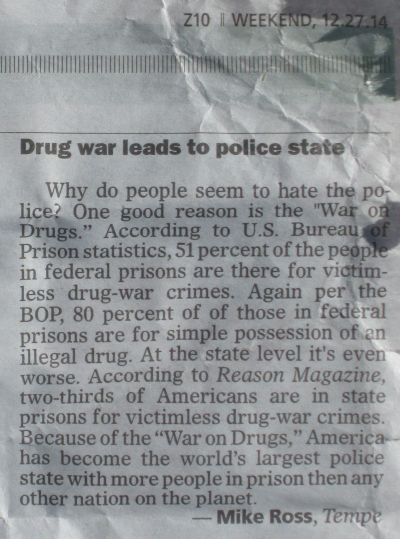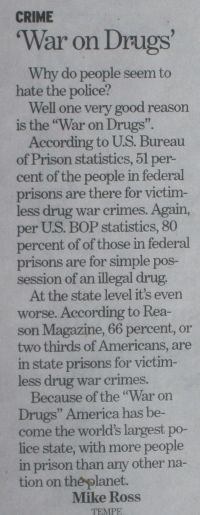Medical marijuana dispensaries want government monopoly on growing & selling recreational marijuana!!!
Dear Editor:The September 22, 2014 Arizona Republic article "Marijuana advocates kick off 2016 initiative" says Arizona medical marijuana dispensaries probably won't support Andrew Myers and the Marijuana Policy Project's (MPP) effort to legalize marijuana:
"Any effort towards full legalization in Arizona is expected to be met with stiff opposition from ... medical-marijuana dispensary owners."That is highly unlikely. If fact the marijuana medical dispensaries will welcome it with open arms because it will probably give them a monopoly on growing and selling recreational marijuana in Arizona.
Prop 203, Arizona's Medical Marijuana Act was written by Andrew Myers and gives the medical marijuana dispensaries almost a virtual monopoly on growing and selling marijuana. According to the Arizona Department of Health Services only 3% Of the medical marijuana patients are allowed to grow marijuana because of the 25 mile rule. The other 97 percent must get their marijuana from a medical marijuana dispsenary.
Andrew Myers , who also runs the Arizona Dispensary Association is expected to write the initiative which MPP will circulate to legalize recreational marijuana in Arizona.
If the initiative is like Prop 203, which Andrew Myers also write it will certainly give the current medical marijuana dispensaries a monopoly on grown and selling recreational marijuana.
Mike Ross
Tempe, AZ
PS - If you want to hear some of the inside information on MPP and Andrew Myers check out his video of the July 2014 Phoenix/Arizona NORML meeting where Andrew Myers spoke on the subject.
Needless to say many of the people that support legalizing marijuana are not happy with giving Andrew Myers and his Arizona Dispsenary Association a government monopoly on growing and selling recreational marijuana in Arizona:
https://www.youtube.com/watch?feature=player_embedded&v=PQZ3AUN41uwHere is a copy of the news article from the Arizona Republic which I cited in my letter to the editor
Marijuana advocates kick off 2016 initiative
Yvonne Wingett Sanchez, The Republic | azcentral.com 12:05 p.m. MST September 22, 2014
Supporters of an effort to legalize recreational marijuana in 2016 have filed paperwork with state elections officials, allowing them to raise money to campaign for the citizens initiative.
The Marijuana Policy Project of Arizona initiative almost certainly will be modeled after the voter-approved marijuana program in Colorado. For about a year, Colorado has allowed adults 21 and older to use and possess up to an ounce of pot, which is purchased at one of the many marijuana shops that are allowed under the law.
Andrew Myers, who is affiliated with the initiative, said Monday the group will bring together a "diverse coalition" to help draft the initiative's language, adding that marijuana advocates are closely watching Colorado's program to determine what should be replicated in Arizona — and what should be avoided.
Voters passed Colorado's Amendment 64 in 22 with 55 percent of the vote, driven by a campaign that pitched marijuana as a less-harmful alternative to alcohol. The amendment attracted young and new voters while tapping into the electorate's libertarian streak.
Representatives of the Washington, D.C.-based Marijuana Policy Project, which advocates for marijuana legalization and regulation, said it will pursue full legalization in Arizona in 2016 because of marijuana-legalization efforts are more successful during presidential elections, which draw more voters to the polls.
Marijuana is legal for about 50,000 Arizonans, but only for medicinal purposes. Patients must get recommendations from a physician and obtain a card from state health officials under the Arizona Medical Marijuana Act approved by voters in 2010.
Any effort towards full legalization in Arizona is expected to be met with stiff opposition from law enforcement officials, and possibly medical-marijuana dispensary owners who have spent the past few years building their businesses around the medicinal model

War on Drugs
East Valley Tribune - 12/28/2014

Letter: 'War on Drugs' causing divide between public, police
Posted: Friday, January 2, 2015 12:45 am
Letter to the Editor
Why do people seem to hate the police?
Well one very good reason is the “War on Drugs”.
According to U.S. Bureau of Prison statistics, 51 percent of the people in federal prisons are there for victimless drug war crimes. Again, per U.S. BOP statistics, 80 percent of of those in federal prisons are for simple possession of an illegal drug. [Sorry the author was unclear on this. The author means that of the 51 percent of people in Federal prisons for victimless drug war crimes, 80% of those are in a Federal prison for simple possession of an illegal drug. The other 20% of those are in prison for sale, manufactor or some other drug war crime]
At the state level it’s even worse. According to Reason Magazine, 66 percent, or two thirds of Americans, are in state prisons for victimless drug war crimes.
Because of the “War on Drugs” America has become the world’s largest police state, with more people in prison than any other nation on the planet.
Mike Ross
Tempe
Letter: ‘War on Drugs’ discriminates
Source
Letter: 'War on Drugs' discriminates
Posted: Sunday, January 18, 2015 12:00 am
Letter to the Editor
Thanks for publishing the outstanding letter from Mike Ross: "War on Drugs."
In 1963, when Dr. Martin Luther King Jr. delivered his famous “I have a dream” speech, the United States had about 200,000 total prisoners.
Today, largely because of our war-on-drugs policies, the United States has more than 2.2 million prisoners. It’s obvious that the so-called war on drugs is actually a war on politically selected people, and black and brown people are the politically selected people.
Even though blacks and whites use and sell illegal drugs at about the same rate, blacks are 13 times more likely to go to jail or prison for a so-called drug crime. I believe this is the root cause of the black community distrusting and disliking of the police.
The whips and chains of slavery have been replaced with prison cages.
Kirk Muse
Mesa
Mike Ross's RAD or Relegalize All Drugs
Here is an
article
about
RAD
in the Phoenix New Times.
RAD or Relegalize All Drugs was created by Mike Ross to end the "War on Drugs" in Arizona.
The Arizona Secretary of State incorrectly called RAD by the name of RAD1 or maybe RAD One.
Six Possible Pot-Related Ballot Measures You Should Know About
Six Possible Pot-Related Ballot Measures You Should Know About
By Ray Stern
Monday, June 8, 2015
A lot of high hopes are riding on the November 2016 general election in Arizona.
Paperwork for no fewer than six marijuana-related ballot measures has been filed with the state Secretary of State's Office in the last few months, with each measure aiming to make fundamental changes to the state's drug laws.
Only two or three are actually viable, most likely. Each needs to gather about 150,000 signatures, a formidable and expensive task.
But if you come across petition gatherers asking for your signature on any of them, here are the basics you need to know:
1) Campaign to Regulate Marijuana Like Alcohol
* Sponsored by the Marijuana Policy Project, the same group that brought medical marijuana to Arizona in 2010.
* Creates state-regulated system of retail cannabis stores.
* Limits: Up to one ounce of buds and up to five grams of concentrated cannabis okay to possess by adults 21 and older. Possession of between one and 2.5 ounces to become a civil offense with a $300 fine and no increased penalty for each violation. Grow up to six plants per person, or 12 per household.
2) Campaign to Legalize and Regulate Marijuana
* Sponsored by activist Jason Medar and Arizonans for Mindful Regulation, a group of cannabis activists who want a more permissive law than what MPP is offering. Related Stories
Poll: 53 Percent of Arizonans Back Legalizing Marijuana
* Measure is 20 pages and has a regulatory scheme similar to MPP's.
* Makes it easier for would-be small-time cannabis entrepreneurs to exist alongside a system of retail stores.
* Limits: Up to one ounce legal for adults 21 and older. No distinction or special limit placed on concentrated marijuana — an ounce of shatter is as legal as an ounce of buds. Possession of between 2.5 and eight ounces for sale drops from a felony to a misdemeanor. Can grow up to 12 plants per person.
3) Arizona Industrial Hemp Farming Act
* Sponsored by HOW Arizona, a Gilbert group represented by Christian Carrasco and Brittany Rose Murphy.
* Legalizes production and sale of hemp for industrial and research use. No apparent limits on number of plants or acres planted.
* Hemp is defined as a cannabis sativa plant registered as having no more than one-third of 1 percent of THC, the psychoactive ingredient in marijuana. Hemp can't get people high, but it can be used to make a large range of products.
* Establishes an Industrial Hemp Committee in Arizona to help manage things.
4) Medical-Marijuana Dispensary Fee Waiver
* Sponsored by the Arizona Marijuana Patient Society, an Apache Junction committee chaired by Timothy B. Cronin.
* Eliminates the annual fee charged by the Arizona Department of Health Services for a medical-marijuana registration card. Currently, food-stamp recipients pay $75 a year, while everyone else pays $150.
* Sponsored by Mike Ross of Tempe and "RAD1 - ReLegalize All Drugs."
[Really it's RAD not RAD1]
* Seeks to create a constitutional amendment that eliminates all laws related to marijuana.
* Prohibits any government regulation of marijuana or cannabis products, whether for consumption, cultivation or sale.
* Releases all marijuana offenders from jail or prison and clears the criminal records of anyone ever convicted of a marijuana-related offense.
6) Re-Legalize All Drugs Including Cocaine, Heroin, LSD, Marijuana, Methamphetamine and Peyote.
* A second minimalist offering by Mike Ross of Tempe.
* In under two pages, the proposed initiative eliminates all laws and regulations of all drugs, including all street drugs (not just those in the title), prescription drugs and over-the-counter drugs.
* Pardons all prior drug offenders and makes it illegal for any cop or government official to interfere with a person's "drug rights. To carry home its point, the measure would make police and government officials personally liable for $1 million in damages for each interfering incident.
See you at the polls.
Got a tip? Email Ray Stern
Follow Ray Stern on Twitter: @RayStern
Follow Valley Fever on Twitter: @ValleyFeverPHX
Wayne Whitlock doesn't seem to have read the Constitution very well.
If he would have only read the 1st and 10th Amendments he would have seen that it's unconstitutional to ban Muslims from entering America.
The First Amendment clearly forbids the government from banning people for exercising their freedom of religion.
The 10th Amendment says:
Letter to the Editor: Sure we can ban Muslims
Posted: Wednesday, December 30, 2015 11:31 am
If anyone says that we can’t ban Muslims from coming to America because it’s unconstitutional, just ask them to read it from the Constitution. They won’t be able to do it because there is NO such statement in the Constitution.
They show their ignorance or their inability to read or understand plain English.
They get that from Article 6 which ONLY deals with those running for public office.
Bet that person $1,000, and you will win every time.
Wayne Whitlock
Wayne Whitlock didn't read the Constitution very well
Dear Editor:
Congress shall make no law respecting
an establishment of religion, or
prohibiting the free exercise thereof;
And since there is no power given to the Feds in the Constitution to allow the Feds to boot Muslims out of the country, the 10th Amendment would also forbid it.
The powers not delegated to the
United States by the Constitution,
nor prohibited by it to the States,
are reserved to the States
respectively, or to the people
Mike Ross
Tempe, AZ
Submitted by Wayne Whitlock
Gilbert